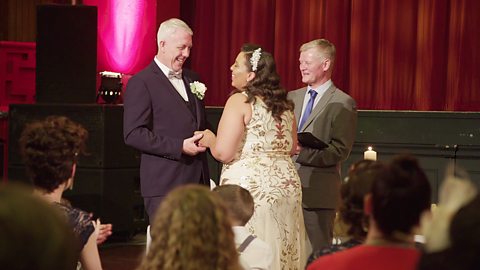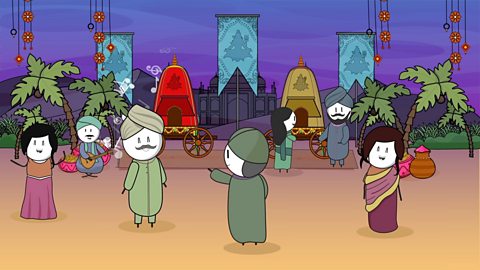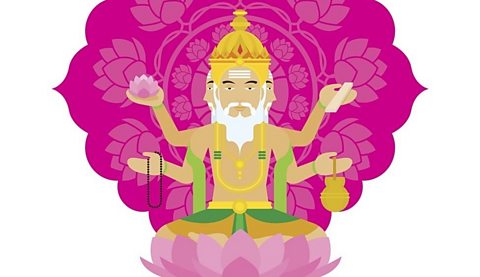Non religious wedding ceremonies
Wedding ceremonies are important for some couples who wish to express love and commitment towards one another in front of their family, friends, and community. Some religious couples may choose to have their wedding ceremony in a place of worship, whereas a non-religious ceremony does not refer to religious ideas, texts, or deities. The couple, with the celebrant, have flexibility in deciding on the structure of the wedding and the vows (promises) that are exchanged. A Humanist wedding is an example of a non-religious ceremony.
Watch Cerys as she celebrates the wedding of her dad and stepmum with her friends and family.
Hi, I'm Cerys and I'm a Humanist.
Now, today is a very important day because today my dad Ian and my stepmum Rushelle are getting married and they're having a Humanist wedding, which is a bit different from religious weddings because instead of saying their vows to God, they'll be saying them in front of their friends and family as witnesses.
The person leading and arranging the wedding is called a Humanist celebrant. He's been working closely with my dad and stepmum to create a very personalised wedding, and they've asked me to do a reading, and to be honest, I'm a little bit nervous.
My dad and my stepmum have so many children between them that I honestly forget most of my siblings' names. But it is the perfect example of a modern-day family, which is also the theme of the wedding.
Marriage is not just about the couple and their future together. It embraces a union of family and friends who played a part in their life. The ceremony is not a religious one.
“And if you dream to dream of meeting your heart's longing.”
But it does have personalised traditions which they've chosen, which is a unity candle, saying their vows and exchanging their rings.
And that's it, it's all over. I had such an amazing time. My reading went quite well and it was amazing seeing everyone come together to celebrate the love that my dad and stepmum have.
The best thing about being a Humanist is it gives people the freedom to follow their own path. This wedding today could have been anything but my dad and my stepmum chose to make it about the most important thing in life. Love.
Humanist marriage
Marriage is a legally binding commitment between two people. Currently, in England and Wales, while couples can have a humanist wedding, it is not recognised as a legal marriage. To make the marriage legally binding, couples have to attend a register office separately. In Scotland and Northern Ireland, couples can have a humanist wedding, which is also legally binding.

Other non-religious celebrations
While most religions have ceremonies that celebrate the birth of a baby, such as baptisms and baby blessings, many non-religious people also wish to celebrate the birth of a baby with their families, friends, and community. Baby naming ceremonies are popular and some of these may be performed by Humanist celebrants. These are joyful occasions that express hopes for the child to have a happy and fulfilling life.
There is no set format for a baby naming ceremony, and often the baby’s parents will choose symbols, readings, and songs which hold personal meaning. During the ceremony, there is no sense of the child being labelled as a Humanist. The focus is on promising to support them to decide for themselves what they believe and how they want to live.

For some non-religious people, being part of a community of like-minded people is very important. Some non-religious people join dedicated groups or societies, such as those linked to the National Secular Society, Humanists UK or local Humanist groups. Some non-religious people take part in the Sunday Assembly or other gatherings where people gather to sing non-religious songs, and hear talks from local philosophers, charity representatives, historians or scientists – anyone with something interesting and thought-provoking to say. For other non-religious people, being part of a group is not important and they are happy to lead their lives without such organised structure.
Non-religious ceremonies in pictures

Image caption, Baby naming ceremonies
Humanist baby naming ceremonies are one way for non-religious parents to celebrate welcoming a baby into the world with their friends and family.
1 of 4
Quiz
Play Bitesize secondary games. game
Have fun playing science, maths, history, geography and language games.

More on World religions
Find out more by working through a topic
- count1 of 10

- count2 of 10

- count3 of 10

- count4 of 10
